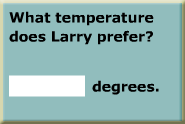Game 3 – Wrist's Office
Description:
This task requires kids to answer questions based on clues provided by one of many sources of noise. At the start of each question, several items in the "office" are playing, including a computer, television, radio, and talking fish, but only one item will provide the information needed to answer the question.
Kids can turn any of the items on or off in order to narrow down the distractions and find the correct answer.
Skills Targeted:
Wrist's Office targets the ability to ignore distractions and selectively focus attention. At the start of each round, kids with ADHD are likely to feel overwhelmed by the number of distractions in the task, but they can selectively turn off distractions. As an alternative, kids can try to cognitively tune out the distracters, but this ability is taxed by complex auditory figure-ground tasks like that found in Wrist's Office.
Many kids will need to physically turn off several (if not all) sources of noise in the office in order to answer the questions correctly.
Unfortunately, many kids with ADHD fail to recognize the need to remove distractions from their personal work areas and, in some instances, even insist that distractions actually help them concentrate. To the contrary, research suggests that distracters are associated with more frustration and less productivity.
Key Terms and Ideas:
For kids with ADHD, the need to find quiet work areas is paramount, and Wrist's Office helps to highlight this need. Parents can liken the experience of Wrist's Office to the overwhelmed feeling and lack of productivity kids with ADHD are likely to experience when work areas include many distractions.
An effective coping strategy is to remove all unnecessary distracters from work areas.
Note: You should not discourage kids from removing distracters in Wrist's Office in order to hear the correct answers, as the game is designed to help kids practice this important coping skill. The challenges created by multiple auditory distracters are likely to be especially true for kids with ADHD, so additional limitations may lead to unnecessary frustration.




